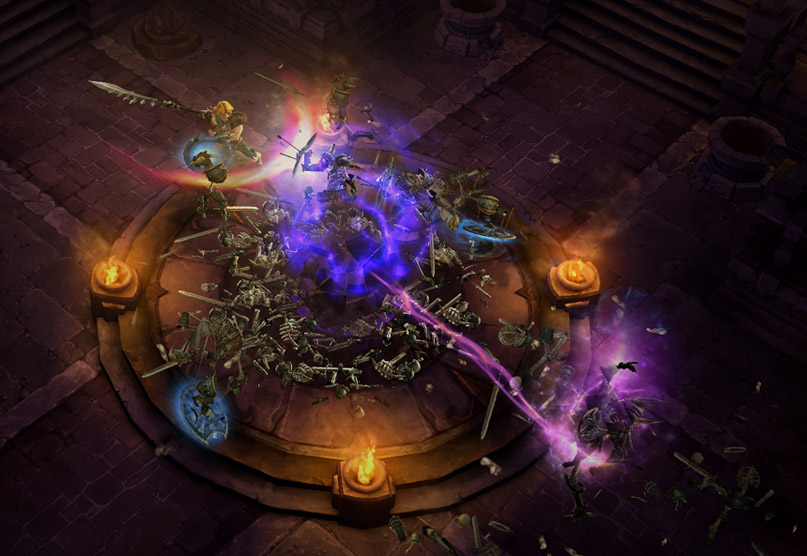 BLOCKCHAIN
BLOCKCHAIN
 BLOCKCHAIN
BLOCKCHAIN
 BLOCKCHAIN
BLOCKCHAIN
Forte Labs Inc., a provider of distributed ledger blockchain technology for the gaming industry, and Ripple Labs Inc., a cryptocurrency payments company, today announced the launch of a $100 million fund to support game developers.
The fund will tie together Xpring, Ripple’s developer ecosystem, and build atop Forte’s blockchain platform using open-source developer solutions in a bid to accelerate the mainstream adoption of blockchain technology for gaming applications.
“Blockchain technologies’ key innovations unlock vast potential for nearly all forms of digital interaction,” said Brett Seyler, chief platform officer at Forte. “Gaming is a $140 billion global industry driven predominantly by digital micro-transaction economies, which we believe will benefit immensely from the integrity and resilience of blockchain technology.”
Blockchain technology has the potential to help game developers create more efficient, more transparent and more secure gaming economies by decentralizing trust in underlying transactions.
It does that by creating a massively distributed ledger of transactions that is at the same time cryptographically designed so that it becomes difficult to forge past activity. The history recorded into the blockchain — be in real-money payments, in game currency activity, virtual item trades or a myriad of other economic activities — becomes an auditable point of truth that can be used to verify past transactions.
Massively multiplayer online games such as “World of Warcraft” and “Guild Wars 2” support millions of players, each of whom transacts with the in-game economy on a regular basis. These two games also provide a way for players to pay real money into virtual economies, creating a real-world value for virtual currency and items. That means faults and fraud that affect the in-game economy can have a substantial impact on game publisher revenue.
The trend for multiplayer gaming has been moving from selling games by the box, with a price tag, to releasing games with what is called a free-to-play model. The game publishers make money from selling virtual items for real money.
With Forte’s blockchain platform, free-to-play game developers gain support for a system that would provide a template for automated, distributed and secure economies. The tamper-proof mechanism of a blockchain ledger would also help reduce potential fraud, detect the exploitation of bugs that lead to the inflation of in game currency (such as item duplication) and keep things running smoothly in a game.
“Both Forte and Ripple have a shared belief that blockchain technology will have a massive impact on games,” said Ethan Beard, senior vice president of Ripple’s Xpring. “Providing tools that are easy-to-use, chain agnostic and interoperable is a necessary step in driving scale consumer adoption.”
Multiplayer games with their own internal economies from the same publisher also have a different problem: It’s difficult for traditional systems to mix separate economies. For example, moving value between “World of Warcraft” and “Diablo III” (pictured), both published by Blizzard Entertainment Inc., is possible but not easy. Many players do it by finding one another on forums or social media and exchanging virtual items between the games — or sometimes for money, although this is against the terms of service for both games.
To ease the exchange of value among separate game economies, which would be on different blockchains, Ripple’s open-source Interledger Protocol with XRP — the underlying currency Ripple uses to settle payments — will act as the layer through which currency and item pair trades are executed. The protocol will also use the container-based hosting solution Codius to support seamless transaction exchanges between blockchains.
By focusing on cross-channel interoperability, Forte expects that large multigame publishers will be able to put these systems to immediate use. The idea is to allow publishers to maintain interest by customers who move between numerous games, so they don’t feel trapped in one title or feel the risk of abandoning virtual valuables for a more trendy game.
For Forte and Ripple, that means developers adopting blockchain technology will be able to build more sustainable, long-term relationships with customers that remain persistent across entire gaming ecosystems. In turn, that should help break down the walls within “walled gardens” and promote social economic activity between players. “The industry needs solutions that can support these economies at scale with cross-chain interoperability,” said Seyler.
The inaugural fund, managed by Forte, will seek out developers that operate in game economies with more than 50,000 daily active users and have an interest in implementing blockchain technology to automate those economies.
Allen Ma, vice president of partnerships at Forte, said the company is actively seeking “developers who are running live game economies with tens of thousands of daily active users or more and have an active interest in using blockchain technology to improve their business.”
Support our mission to keep content open and free by engaging with theCUBE community. Join theCUBE’s Alumni Trust Network, where technology leaders connect, share intelligence and create opportunities.
Founded by tech visionaries John Furrier and Dave Vellante, SiliconANGLE Media has built a dynamic ecosystem of industry-leading digital media brands that reach 15+ million elite tech professionals. Our new proprietary theCUBE AI Video Cloud is breaking ground in audience interaction, leveraging theCUBEai.com neural network to help technology companies make data-driven decisions and stay at the forefront of industry conversations.